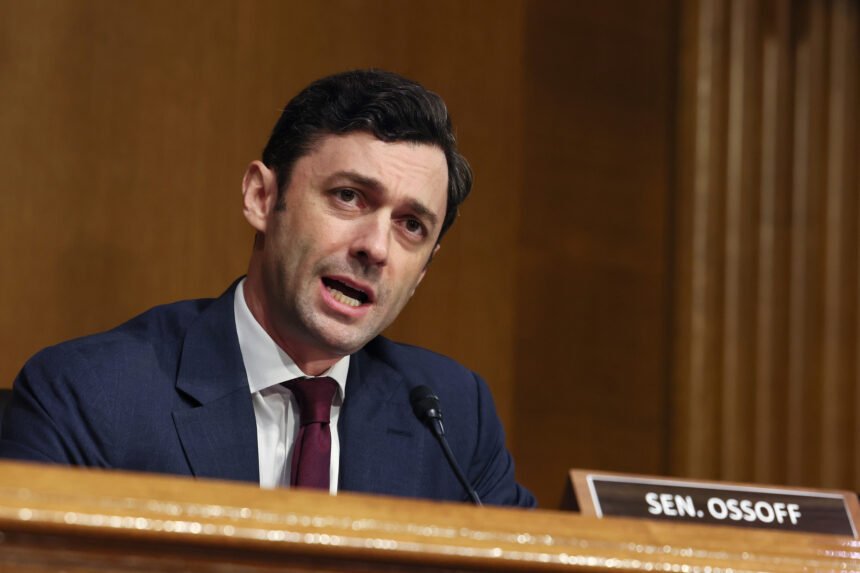Senator Jon Ossoff outpaced his Republican challengers in the last fundraising quarter of the Georgia Senate race, expected to be one of the most competitive elections of the 2026 midterms.
Ossoff’s campaign manager told Newsweek the fundraising reflects “unstoppable momentum” ahead of the midterms, while a spokesperson for GOP Insurance and Safety Fire Commissioner John King said the campaign is “pleased” with the fundraising in only a six-week time frame.
Why It Matters
Georgia has emerged as one of the nation’s newest battlegrounds. Although former President Joe Biden narrowly carried the state in 2020, President Donald Trump flipped it back into the Republican column last November.
Historically, the party in the White House loses seats during the midterms, so Democrats are hoping to expand their majority, which would likely require them to hold onto all the seats they currently hold. However, Republicans view Georgia as among their best opportunities to flip a Senate seat next year. The race is likely to garner national attention—and major investments from both parties.
What to Know
Ossoff, first elected in 2021, led the pack in terms of fundraising from April to June, according to each campaign’s quarterly report with the Federal Election Commission (FEC). In total, he reported total receipts of just over $10 million for the quarter, with more than $15 million in the bank.
On the Republican side, Representative Buddy Carter held a fundraising advantage over King.
Carter raised over just over $1 million, along with an additional $2 million loan, and ended the quarter with about $4 million on hand. Meanwhile, King raised about $520,000 and ended the quarter with about $450,000 in the bank, according to the report. He is also transferring an additional $500,000 to a Super PAC, the Atlanta Journal-Constitution reported.
King’s spokesman Dan McLagan told Newsweek the campaign is “pleased” with the fundraising.
“Between what we raised for the campaign and raised to the federal PAC and transferred to the federal PAC, is over $1 million, it’s a pretty solid start in six weeks,” he said.
McLagan added that Ossoff and the Republican nominee will likely raise $100 million by next November, noting that Georgia elections have become more expensive.
“That’s just the reality of these races in Georgia,” he said. “We’ve seen it, the Republican and Democrat nominees both raise roughly the same amount of money, going up stratospherically each cycle.”
Ellen Foster, Ossoff’s campaign manager, touted the fundraising in a statement to Newsweek.
“The Ossoff campaign is building unstoppable momentum to win next November, and the small-dollar, grassroots movement is the backbone of our victorious coalition. We’re grateful for the overwhelming support,” she said.
Newsweek also reached out to Carter’s campaign for comment via his online contact form.
Jemal Countess/Getty Images for Breakthrough T1D
How Critical Is Fundraising in Georgia Senate Race? Political Scientist Weighs In
Ossoff having an early fundraising lead isn’t surprising, as he has a “strong base of support, especially in the Atlanta metro,” William Hatcher, chair and professor of social sciences at Augusta University, told Newsweek on Friday.
Hatcher said once Republicans decide on a candidate, their fundraising may increase.
“It’s also unclear the importance of being ahead in fundraising today in politics. It still matters, but we’re not sure it matters as much as it once did,” he said. “Research use to show that all things being equal with candidates, the one who raises the most money is likely to win. However, today in such a fractured media environment, where candidates can go viral and get coverage without spending much money, the importance of fundraising lead isn’t as clear.”
Early polls of the race give Ossoff a lead over Carter and King.
A Cygnal poll, conducted among 610 likely voters from June 16 to 18, showed him up seven points against Carter (49 to 42 percent) and 10 points against King (50 to 40 percent). It had a margin of error of plus or minus 3.92 percentage points.
Other Republicans like Representative Mike Collins have also floated a potential run. Governor Brian Kemp, who has enjoyed strong approval ratings in the state, opted against a Senate run.
What People Are Saying
William Hatcher, chair and professor of social sciences at Augusta University, told Newsweek: “Georgia can be more expensive state than others because of the media market around Atlanta. The 2022 US Senate race also showed us that a high-profile election where both parties are focused on winning the seat can be expensive in Georgia.”
Kyle Kondik, analyst for Sabato’s Crystal Ball, wrote in a May report: “We are keeping Georgia as a Toss-up in our ratings as we see how the field develops following Kemp’s announcement, but it’s closer to being Leans Democratic than Leans Republican. The opposite would have been the case, at least to start, if Kemp had run.”
What Happens Next?
Candidates may still jump in over the coming months, and more polling could come out and indicate how competitive the race may become. The Cook Political Report currently rates Georgia as a toss-up for 2026.











